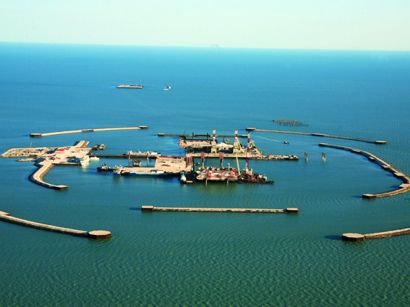 Resumption of production at the Kashagan field in Kazakhstan is unlikely to happen in 2015 or 2016, according to Oleg Yegorov, the senior fellow at the Institute of Economics of the Kazakh Education and Science Ministry.
Resumption of production at the Kashagan field in Kazakhstan is unlikely to happen in 2015 or 2016, according to Oleg Yegorov, the senior fellow at the Institute of Economics of the Kazakh Education and Science Ministry.
“I believe it will not take place before 2017," Yegorov told Trend by telephone April 30.
Kazakhstan expects the oil production at Kashagan to resume in late 2015 or in 2016.
Yegorov recalled that it is needed to replace about 200 kilometers of pipes at the field. The work should be conducted not only on the coast, but also on an artificial island built at the field and in the sea.
“In technical terms, it is quite complex and long-term work," he said. “Aside from that, it will be possible to conduct work on the offshore site in the warm season, because in winter the sea near the Kashagan field is frozen."
Moreover, as the expert said, depending on the situation on the world market, it is possible that the resumption of production at Kashagan will not start in 2017 either and will be postponed to a later date.
“In particular, if the oil demand is less than the offer, and the oil prices remain for a long time at a low level, the production at Kashagan may prove to be unprofitable, and the field can be mothballed for some time," said the expert.
Egorov reminded that the developers of Kashagan had to make huge amount of investments in this field. Now, they are required to additionally invest over $2 billion for changing the pipes, he said, adding that moreover, the shareholders of the project should pay a huge amount of fine as they haven't put the field into operation in the time envisaged in the contract.
He said that in order to ensure the profitability of oil production at Kashagan, the oil prices should be $80-$90 per barrel. The production at the similar offshore fields, for instance, in the Gulf of Mexico or the North Sea became profitable with these prices, he said.
“No one will work at a loss," Egorov said.
He added that all the timeframes and obligations of the project's operator envisaged in the contract have long ago been violated.
The expert reminded that the first time when the developers were supposed to put the field into operation in 2005, they gave Kazakhstan the chance to repurchase the first part of its share in the project (8.3 percent). Two years later, they were supposed to put the field into operation again, but they didn't and as a result, the shareholders sold over 8 percent more to Kazakhstan, he added.
Therefore, another postponement of field's launch for one reason or another will not be something extraordinary, but just another violation of the contract, Egorov added.
At the same time, even if oil production at Kashagan is resumed, investments in this project will not pay off very soon, because production volumes will be small at the initial stage, according to the expert.
Kashagan is a large oil and gas field in Kazakhstan, located in the north of the Caspian Sea. The geological reserves of Kashagan are estimated at 4.8 billion metric tons of oil. The total oil reserves amount to 38 billion barrels; some 10 billion out of them are recoverable reserves. There are large natural gas reserves at the Kashagan field - over one trillion cubic meters.
The production at the Kashagan field started Sept. 2013, but in October, it was ceased after a gas leak in one of the main pipelines. The analysis revealed numerous cracks in the pipeline, which needed to be completely replaced. The replacement was said to take at least two years.
Source: trend.az
 В Атырау -10
В Атырау -10